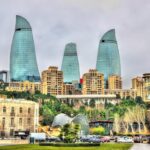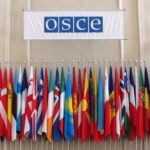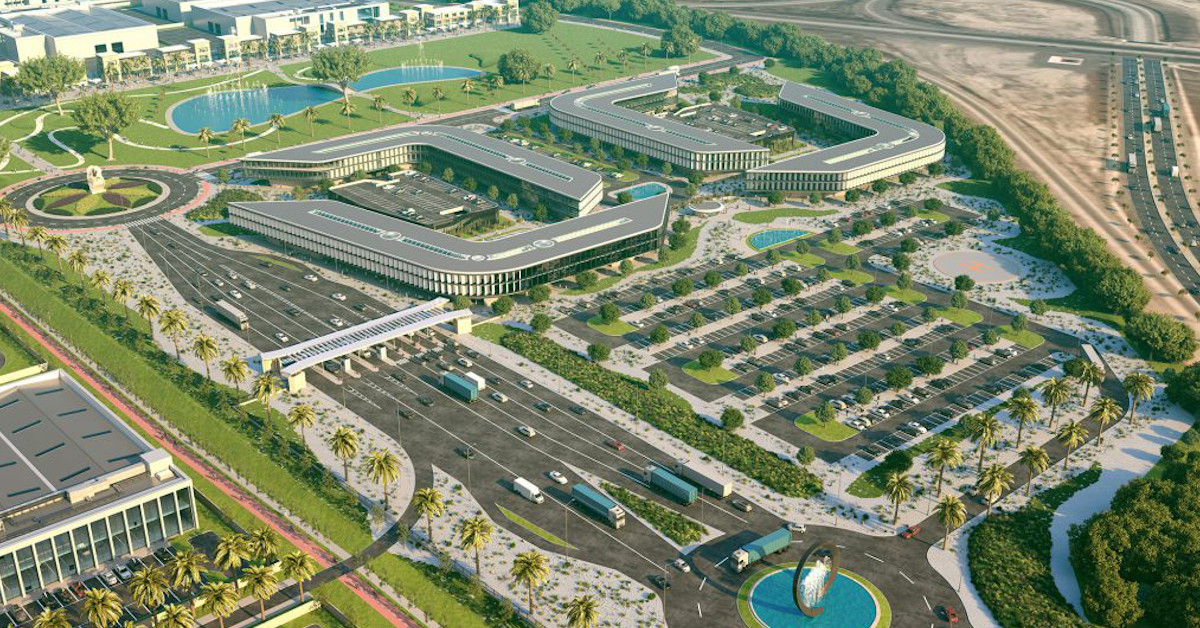Introduction
Free Economic Zones (FEZs) are a cornerstone of modern global economies, designed to spur economic growth and attract investments. The first FEZs emerged in the 1950s in the United States, followed by successful implementations in Japan, South Korea, and China. China’s establishment of Special Economic Zones (SEZs) in Shenzhen, Zhuhai, and Xiamen in the 1980s marked the beginning of its economic miracle, transforming it into a global economic powerhouse.
Today, over 130 countries host around 6,000 FEZs, varying in size, function, and purpose. According to World Bank reports, FEZs contribute over $200 billion to global exports. These zones offer businesses various incentives, such as tax breaks, simplified administrative procedures, access to infrastructure, and exemptions from certain customs duties.
The concept of creating FEZs in Azerbaijan has been discussed for many years, but it has only recently begun to take shape. Established in 2017, the Alat Free Economic Zone (AFEZ) holds a pivotal position in this strategy. Despite economic challenges posed by the pandemic, the project has made significant strides. On July 1, 2021, President Ilham Aliyev laid the foundation of the zone, underscoring its national importance. By 2022, AFEZ had signed its first agreement with the Israeli company BioPharmax to establish a medical products manufacturing plant. This milestone marked the beginning of attracting other international investors and integrating advanced technologies into Azerbaijan’s economy.
The launch of AFEZ’s first phase on June 9, 2023, covering 60 hectares, was a significant step toward realizing Azerbaijan’s ambitious economic plans. This phase includes ready-to-invest sites with necessary infrastructure, customs checkpoints, and office buildings to streamline administrative processes.
Strategic Goals of AFEZ
The primary goals of AFEZ include diversifying the economy and attracting foreign investments. Situated near the Port of Baku, AFEZ offers investors substantial tax incentives and access to quality infrastructure. The zone aims to attract high-tech manufacturing, boost exports, create new jobs, and strengthen economic ties with international markets. Simplified administrative procedures and robust investment protection create an attractive investment climate.
Developing export-oriented industries is a key objective of AFEZ. Establishing such enterprises increases their share in Azerbaijan’s economy, promoting diversification and reducing dependence on the oil sector. This fosters the growth of non-oil industries.
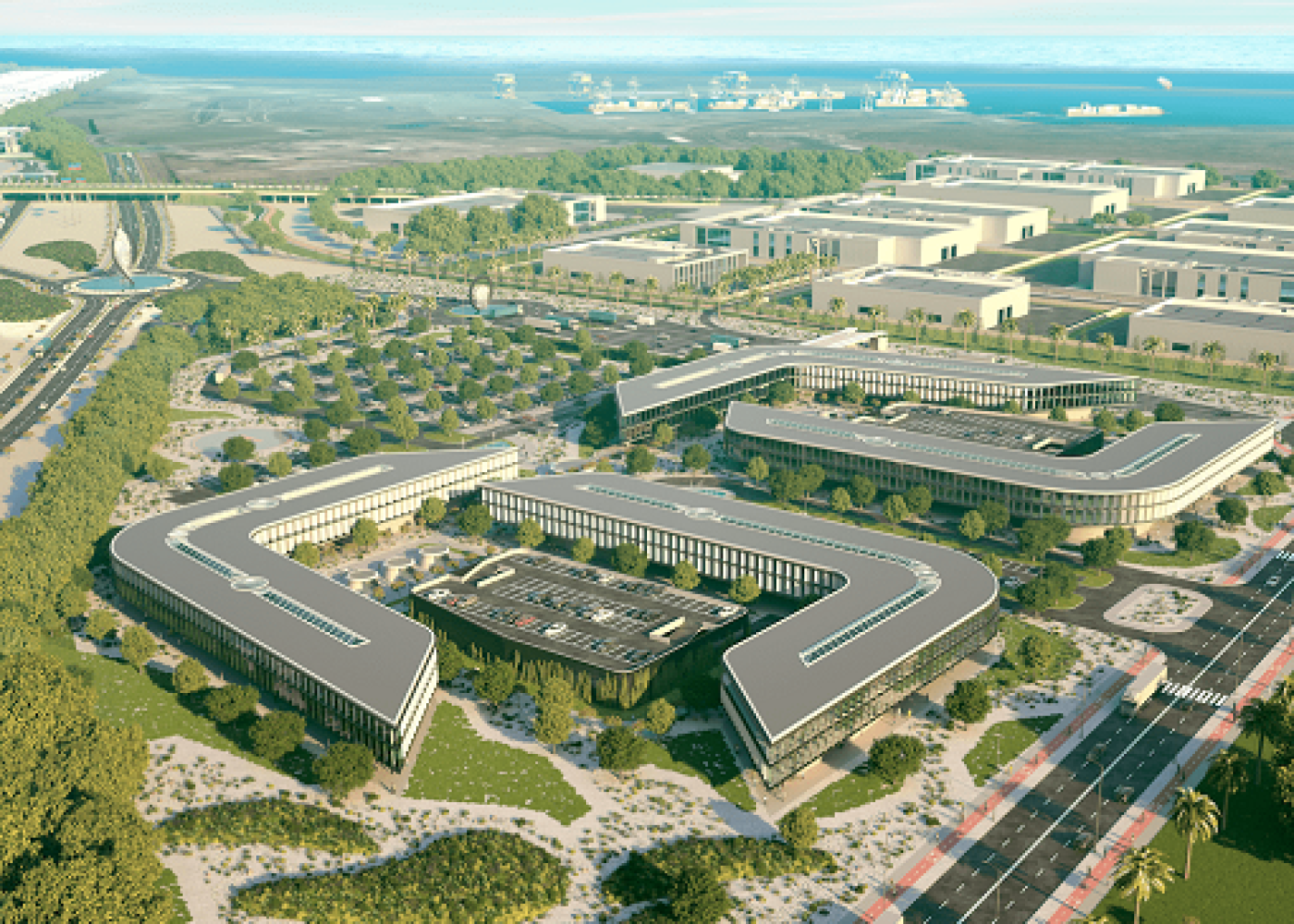
Integration into global economic chains is another strategic goal. Collaborating with international corporations and participating in global supply chains enhances logistical and transport infrastructure, boosting international competitiveness. Attracting companies with advanced technologies promotes the development of innovative economic sectors.
AFEZ’s mission is to create a competitive economic environment that fosters sustainable development and integrates Azerbaijan into the global economy. This includes ensuring transparency and stability in the legal regime for investors, protecting their rights and interests, including intellectual property.
Supporting sustainable economic growth involves enhancing productivity, developing infrastructure, and promoting socio-economic development. AFEZ also aims to become a hub for innovation and technology by attracting high-tech companies and supporting startups and SMEs in the innovation sector. Enhancing local specialists’ skills and developing human capital are also priorities.
Ultimately, AFEZ strives to be a leading center of economic development in the region, attracting investments, fostering new technologies, and integrating Azerbaijan into the global economy. Achieving these goals will promote sustainable economic growth, diversify the economy, and improve the population’s quality of life.
Capabilities and Opportunities
Within the Alat Free Economic Zone (AFEZ), two logistics centers will be established to meet the logistics needs of legal entities: the AFEZ Logistics Center and the Alat Bay Industrial Development.
AFEZ Logistics Center
The AFEZ Logistics Center will provide logistics services over an area of 160,000 square meters, primarily through rail transport. This center will be connected to the Baku International Sea Trade Port, major railways, and highways leading to the borders. It will be equipped with the latest technology, operational management systems, and security measures to meet all the logistical needs of businesses operating in AFEZ.
The center will offer loading and unloading services, acceptance control and procedures, and support for import and export activities of legal entities. Additionally, the center will provide storage services and handle transit cargo. The project spans 16 hectares, with construction set to commence soon. Part of the construction is expected to be completed by early 2024, allowing the center to begin offering services. Full completion is scheduled for the end of 2024, after which the center will operate at full capacity.
The AFEZ Logistics Center will feature warehouse facilities with a total capacity of 15,500 pallets over 14,500 m², including 2,200 pallets for special storage needs, 12,000 pallets for dry goods, and 1,300 pallets for temperature-controlled items. The 10,000 m² cross-dock area will include 3,000 m² for temperature-controlled goods and 7,000 m² for dry goods. The storage and cross-dock buildings will support the simultaneous loading and unloading of 50 vehicles. The center will have 4,000 meters of railway tracks, including three 550-meter tracks (a total of 1,650 meters) for container loading and unloading operations, and 2,000 meters of railway tracks for the simultaneous loading and unloading of 40 railcars.
The container yard will handle 100 containers per hour using one rail-mounted gantry crane and three container reach stackers. The storage capacity will be 800 TEU for full containers and 3,400 TEU for empty containers. The roofs of the AFEZ Logistics Center buildings will be equipped with solar panels covering an area of 35,000 m², generating 5.1 MW of energy, contributing to an eco-friendly environment and a sustainable economy.
Alat Bay Industrial Development
Alat Bay Industrial Development AFEZCO (AlatBay) is one of the first legal entities established in AFEZ and is a subsidiary of the UAE-based Galanth Group Holding. AlatBay will provide value-added logistics services and produce packaging materials within AFEZ. The 5-hectare AlatBay logistics center will primarily meet the import and export needs of legal entities within AFEZ via road transport and handle transit cargo.
AlatBay aims to become a modern logistics hub by integrating innovations and advanced technologies in the industry. To support its strategic expansion, AlatBay will offer a full range of logistics services, including storage, packaging, labeling, loading and unloading, international transport, and forwarding. Additionally, the company will produce a wide range of eco-friendly packaging materials, including large bags and pallets.
According to the company’s investment plan, the first phase of the project involves creating a 5,000 m² logistics center to provide these logistics services to AFEZ legal entities. Construction will begin soon, and the center will start operations in April 2023. The second phase will expand the logistics center and build production facilities for packaging materials and euro pallets, to be completed by the end of 2023 and operational by early 2024. The third phase will involve further expansion of production and storage facilities, starting full operation in 2025.
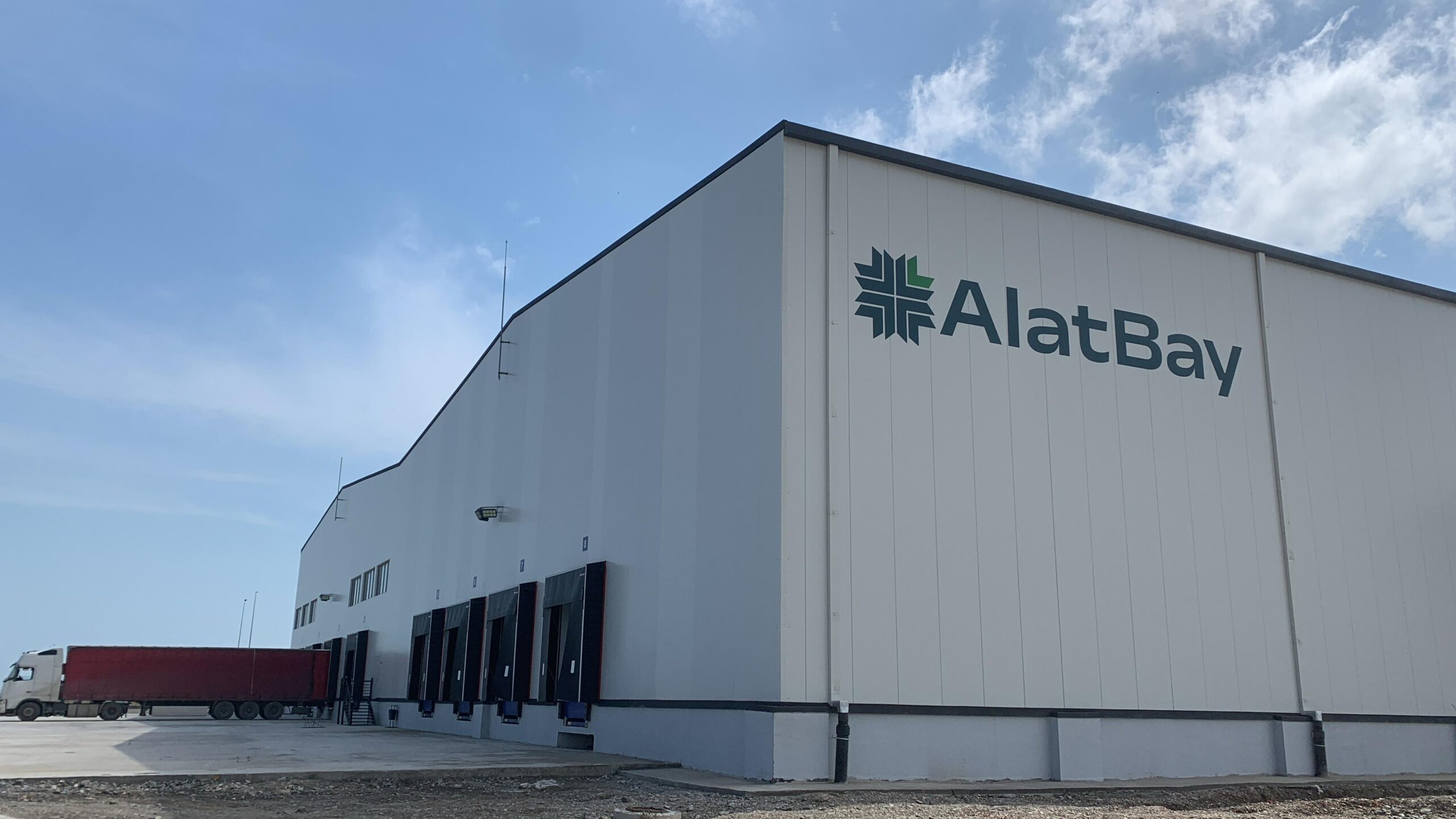
The AlatBay logistics center will feature three types of warehouses with a capacity of 5,000 pallets over 12,000 m², including 7,000 m² for dry goods and 5,000 m² for cold and frozen products. All facilities will be built according to modern construction standards, utilizing advanced technological solutions and eco-friendly technologies.
The AlatBay project will impact regional supply chains within the Transcaucasian and Trans-Caspian routes, both East-West and North-South directions, strengthening Azerbaijan’s position as a regional logistics hub, contributing to the development of the non-oil sector of the economy, and adding value to export-oriented activities and businesses.
AlatBay will contribute to regional economic development by optimizing time and cost through increased throughput capacity of the Transcaucasian route, providing storage services for dry, cold, and frozen goods to AFEZ legal entities and transit clients, and operating as the first eco-friendly warehouse in the region with 40-50% energy savings. AlatBay will also promote an environmentally friendly environment by producing eco-friendly packaging materials, reducing energy consumption, and minimizing water pollution.
The warehouses built by AlatBay will meet high technological standards, minimizing environmental impact. Environmental impact will be reduced by cutting down the number of trips and transitioning to an eco-friendly warehouse. An ammonia refrigeration system will be installed, offering numerous advantages over freon systems, including lower environmental impact. Ammonia is an eco-friendly solution with zero Ozone Depletion Potential (ODP) and zero Global Warming Potential (GWP). The ammonia system also consumes up to 40% less electricity due to its thermodynamic properties.
The heat recovery system and high-quality insulation will also help minimize environmental impact. A Shell & Plate heat exchanger will be installed on the ammonia screw compressor line, and the warehouse’s walls, doors, dock shelters, pipes, and tanks will have high-quality polyurethane insulation. The proposed insulation system will surpass other cold chain warehouses in the region. Additionally, remote temperature monitoring tools will be deployed, allowing real-time detection of system inefficiencies and monitoring of cold chain chambers. These features are expected to reduce overall energy consumption by 40-50%.
AlatBay Logistics Center has successfully completed the design, construction, and audit stages of the EDGE GREEN certification process and has been awarded the EDGE ADVANCED GREEN certificate. EDGE is an innovative methodology implemented by the International Finance Corporation (IFC) in the field of green investments.
The Alat Bay Logistics Center currently provides various logistics and warehousing services related to cargo management to local and foreign companies, as well as the legal entities within the Alat Free Economic Zone. With the support of the European Bank for Reconstruction and Development (EBRD), international consultants specializing in green investment were hired for the design of the Logistics Center, and all project work was carried out based on the EDGE GREEN methodology.
As a result of the project implementation, a 41% reduction in energy usage and a 26% decrease in water consumption have been achieved. This project, which meets an exceptional level of environmental impact, will have a lasting positive effect not only on its users but also on the environment for years to come.
Achieving the EDGE GREEN standards is a significant success for AlatBay, particularly as the country anticipates hosting the prestigious COP-29 event in a few months. AlatBay reaffirms its commitment to continuous innovation and environmental excellence, demonstrating that everyone can contribute to protecting the environment by conserving our natural resources.
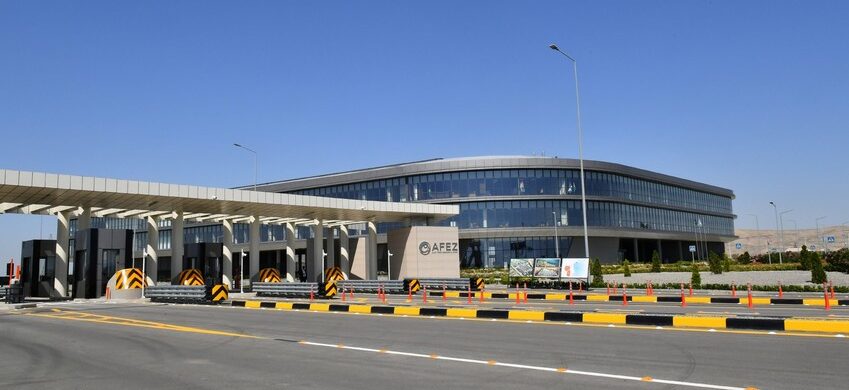
Sea Transportation
In the first phase, the port’s total annual capacity was 15 million tons in 2023, with about 45% utilized in the previous year. With the development of the Middle Corridor, the annual capacity is expected to increase to 25 million tons in the second phase.
Air Transportation
A cargo airport will be built in AFEZ to meet the freight needs of legal entities and other stakeholders. The implementation of this project has already begun. In the first phase, the airport’s capacity will be 500,000 tons per year, gradually increasing to 1.5 million tons per year. The cargo airport is expected to be operational by the first quarter of 2026.
Legislative and Regulatory Framework
The creation and operation of FEZs in Azerbaijan are based on a well-developed legislative and regulatory framework designed to ensure favorable conditions for investors and stable zone development. AFEZ’s legislative and regulatory framework comprises laws, regulations, and rules aimed at creating an attractive investment climate and protecting investor interests.
Key elements include tax and customs benefits for zone residents. Companies registered in AFEZ are exempt from VAT, corporate income tax, withholding tax, and other corporate taxes. Customs duties and taxes on importing and exporting goods to and from the zone are also absent, significantly reducing company costs and making business operations in AFEZ more advantageous.
The regulatory framework also focuses on labor relations. Legislation exempts salaries of workers earning up to 8,000 manats (approximately $4,700) per month from taxation. For highly qualified foreign workers, social insurance contributions are voluntary, attracting international specialists and experts to the zone.
Investment protection and investor rights are a priority. Investor assets are protected from nationalization and restrictions, providing confidence in investment security. Foreign legal and natural persons can own property in the zone without restrictions or local partner requirements. Currency operations and profit repatriation are unrestricted, allowing investors to manage their earnings freely.
AFEZ’s activities are managed and regulated by an authorized body responsible for zone development, investor attraction, and ensuring compliance with regulatory requirements. This body also provides one-stop-shop services, simplifying interactions with state structures and reducing administrative barriers.
Azerbaijan has joined several international conventions on investment dispute resolution and signed free trade agreements with various countries, further strengthening legal protection for investors. These measures create positive signals for foreign investors and attract international capital to AFEZ.
Infrastructure Development
Infrastructure development is a priority for AFEZ. The zone boasts modern office and production facilities, customs areas and checkpoints, engineering communications, roads, and transport interchanges. Infrastructure development aims to create favorable business conditions and meet resident needs. The zone offers modern offices, warehouses, production workshops, and engineering communications.
AFEZ’s location at the crossroads of strategic transport corridors provides significant logistical and transit advantages. The “North-South” corridor connects Russia with Iran and India through Azerbaijan, while the “East-West” corridor links China and Central Asia with Europe via the Caspian Sea and the Caucasus. This positioning enables AFEZ to integrate effectively into global transport and logistics networks, ensuring seamless movement of goods between Europe and Asia.
A key infrastructure element is the new zone at Alat Port, which includes a major seaport. The port enhances transit and transport capabilities, making it a crucial regional logistics hub. Equipped with modern equipment and technologies, the port handles large cargo volumes efficiently, reducing transportation time and costs, making AFEZ an attractive business location.
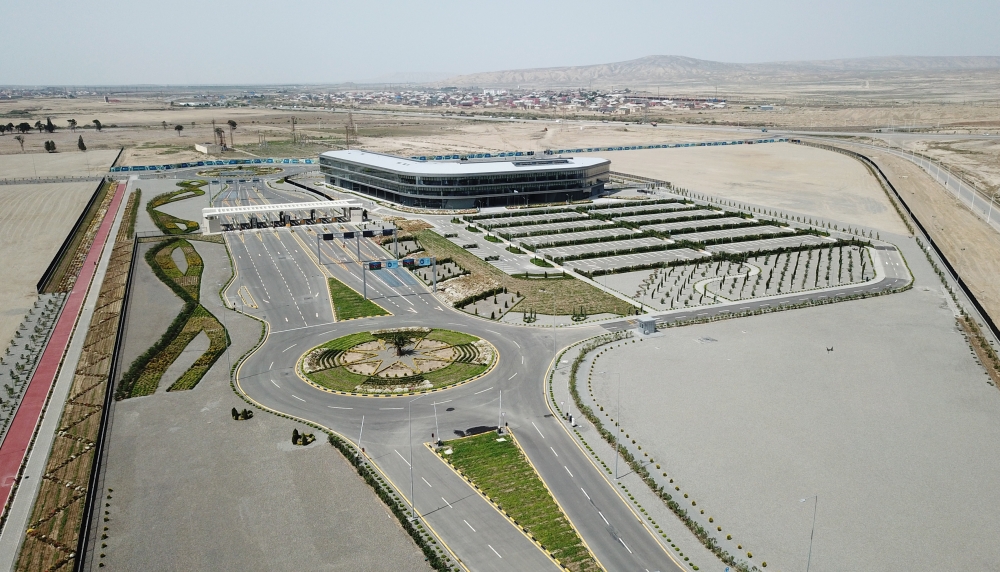
Environmental Standards and Sustainable Development
AFEZ emphasizes environmental standards and sustainable development principles. In the context of global climate change and increasing awareness of environmental protection, AFEZ aims to minimize its environmental impact and promote sustainable economic growth.
AFEZ operates in compliance with national and international environmental standards, ensuring strict adherence to environmental protection regulations. Companies in the zone must comply with established norms for emissions into the air, water, and soil. Regular monitoring and waste management, focusing on recycling and minimization, are conducted. Implementing energy-efficient technologies and using renewable energy sources, such as solar and wind power, help reduce the carbon footprint of enterprises. Companies are encouraged to reduce energy consumption and transition to environmentally friendly fuels.
Efficient water resource use and wastewater quality control are also priorities. Modern water purification and recycling systems prevent waterbody pollution. Protecting and restoring natural ecosystems includes land reclamation and preserving local flora and fauna.
AFEZ’s social responsibility manifests in creating safe and favorable working conditions, developing social infrastructure, including educational and medical institutions, and providing social protection and support to the local population. Environmental responsibility includes reducing environmental impact, adopting green technologies, conducting regular environmental audits, supporting natural resource conservation initiatives, and promoting environmental education.
AFEZ actively supports and implements various environmental initiatives and projects, such as developing and adopting green technologies, conducting environmental education programs and campaigns, implementing social projects to improve local population quality of life, and supporting vulnerable groups.
Environmental standards and sustainable development principles are integral to AFEZ’s strategy. Adhering to strict environmental norms, implementing energy-efficient technologies, and supporting social initiatives create a sustainable and favorable environment for business and the community. This, in turn, strengthens AFEZ’s position as a leading economic development center, attracting investments and supporting sustainable growth.
Challenges and Recommendations
Despite AFEZ’s significant potential, certain challenges may hinder its effective development and operation.
One major issue remains bureaucratic barriers and administrative procedures. Despite the one-stop-shop principle, some investors may still encounter bureaucratic hurdles and complexities during registration and licensing. Further simplifying administrative procedures and enhancing the one-stop-shop system can reduce these barriers.
Infrastructure constraints are also a concern. While significant efforts are made to develop it, some zone areas still need improved transport and engineering infrastructure for full functionality. Continued investments in infrastructure projects, including enhancing transport routes, energy supply, water supply, and telecommunications, will meet resident needs.
A shortage of skilled labor could also be a significant problem. Highly qualified specialists are crucial for the zone’s successful operation, but some sectors may face a skilled labor shortage, hindering high-tech project implementation. Developing training and retraining programs in collaboration with universities and vocational institutions is essential. Attracting foreign experts and creating conditions for their work in AFEZ can also address the skilled labor shortage.
Rapid industrial and production capacity development can lead to environmental risks if strict compliance with environmental standards is not ensured. Strictly controlling adherence to environmental norms and standards and developing environmental protection programs is necessary. Adopting advanced green technologies and practices will help minimize environmental impact.
Internationally, AFEZ will face competition from other FEZs offering more favorable conditions for investors. To enhance AFEZ’s competitiveness globally, active promotion in international markets, participation in international exhibitions and forums, and offering unique conditions and benefits to investors are essential.
Strategic partnerships with international companies and organizations and establishing strong ties with international and local partners, including private companies, government organizations, and NGOs, can strengthen AFEZ’s position, attract new investments, and implement joint projects aimed at sustainable zone development.
Conclusion
The Alat Free Economic Zone (AFEZ) is a strategic initiative for Azerbaijan, aimed at economic diversification and attracting foreign investments.
AFEZ plays a crucial role in integrating Azerbaijan into global economic chains, fostering cooperation with global corporations, and enhancing logistical infrastructure. This will boost the country’s international competitiveness and attract advanced technologies, supporting the development of innovative economic sectors. Achieving the zone’s strategic goals will promote sustainable economic growth, diversify the economy, and improve the population’s quality of life.
In the long term, AFEZ has the potential to become a model for successful FEZ development, demonstrating how sound management and strategic planning can transform an economy and create favorable conditions for business and society.


